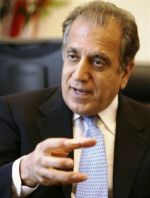Feature: Diplomatic victory for US on Darfur force resolution
By Wasil Ali
July 31, 2007 (NEW YORK) — Last week the US ambassador at the UN Zalmay Khalilzad set the record straight for the requirements of the force to be deployed in Darfur. Khalilzad said there are three elements of the resolution which are not negotiable. A single command and control structure provided by the UN, a Chapter VII mandate for the troops and a specific timeline for deploying the force as expediently as possible.

The Chinese envoy at the UN Wang Guangya echoed the call last week saying that “there is no need to bring other unnecessary elements into this resolution which might in a way delay the process”.
China which has strong commercial interest in Sudan supported the latter during the closed door meetings to formulate the resolution on the Darfur peacekeeping force. A key reason why the resolution was in limbo for over forty days at the UN.
Khartoum made it clear throughout the deliberations on the text that it will not accept a Chapter VII mandate for the force. Sudan’s interior Minister Zubeir Bashir Taha told Reuters that his government rejects the Chapter VII because “this [Sudan] is a free state”.
The Sudanese government’s objection to the tough mandate is two-fold. Khartoum had a unique interpretation of the Addis Ababa communiqué that laid the groundwork for the UN-AU hybrid force. This understanding leads Khartoum to insist that the security of the Darfuri people is its responsibility along with the support of the African Union.
Second, the Sudanese government wants to appease its army which views a strong mandate for the peacekeeping force as a threat to its authority in Darfur. The new force is likely to limit the army’s ability to conduct military operations in the region particularly aerial bombardments.
Sudan’s other objection was any form of UN command and control over the forces. Khartoum views the UN command as vulnerable to political manipulation by Western nations. Also Sudanese officials want the AU to be in command given the fact that this regional organization has been politically more supportive of Khartoum.
The Sudanese government also reacted with hostility to the call by the US to allow UN-AU force on the ground in Darfur by October 1st. A senior Sudanese official speaking to the daily Al-Hayat newspaper published in London said that the early transfer is an “unjustified rush”.
According to analysts Khartoum was and still is hoping to resolve the Darfur crisis prior to any troops arriving in Darfur in order to save face before the hardliners in the ruling National Congress Party (NCP). Sudan’s acceptance of the hybrid force after strong and somewhat militant opposition from its president created a shockwave among the popular base of the NCP.
Al-Bashir defended his government acceptance of the force by accusing the media of “weakening Sudan’s position” internationally. Last year Sudanese authorities banned an edition of the Al-Sudani containing criticisms of Al-Bashir for his continued rejection of UN forces in Darfur. At the time Sudanese journalists accused the government of imposing press restrictions in order to prevent media support for a UN resolution which calls for the deployment of UN troops in the country.
Khartoum was relying on Beijing to secure removal of all the items it disapproved of from the text of the draft resolution. Removal of the sanctions threat from the resolution after pressure from China encouraged Khartoum to request further changes. A Western official told Reuters last week that China objected to having Chapter 7 in the resolution and to a “unified chain of command” under the United Nations for the joint force.
But the US resisted any changed to what it called the ‘core’ elements of the resolution. Perhaps Washington was the most outspoken in that regards despite not being one of the co-sponsors of the resolution. On top of that the US managed to incorporate an earlier transition date for the force from December 31st to October 1st.
Sudan remained adamant till the very last moment that the Chapter VII, UN command references from the resolution. However for unknown reasons their Chinese ally had a change of heart over the weekend. For the first time China explicitly supported the inclusion of Chapter VII in the resolution. Perhaps the threat made last Friday by Steven Spielberg of quitting his role as artistic director of the Beijing Olympics may have prompted the change in positions.
Subsequent to the new Chinese position, Sudan’s UN envoy Abdalhaleem Abdalmahmood began to tone down his criticism of the resolution. Abdalmahmood appeared to have come to terms with the new reality that his government has exhausted any leverage to make further changes to the text.
Following the adoption of the resolution, Abdalmahmood uneasily welcomed it saying that “it contained many positive elements” which is a clear indication that Khartoum did not get all it wanted. Moreover he said that Sudan’s government agencies would review the resolution.
Then late last night Abdalmahmood made statements to the Al-Jazeera Arabic television in which he blasted the US and accused it of having a ‘hidden agenda that goes beyond Darfur’ because it threatened Khartoum with sanctions in the event of non-compliance with the resolution.
The world will be anxiously waiting to see if the hybrid force will become a reality on the ground. The Darfur crisis has become a domestic and foreign priority for many governments around the world. This is a crucial moment for Darfur which may determine the future of this troubled region.
(ST)
